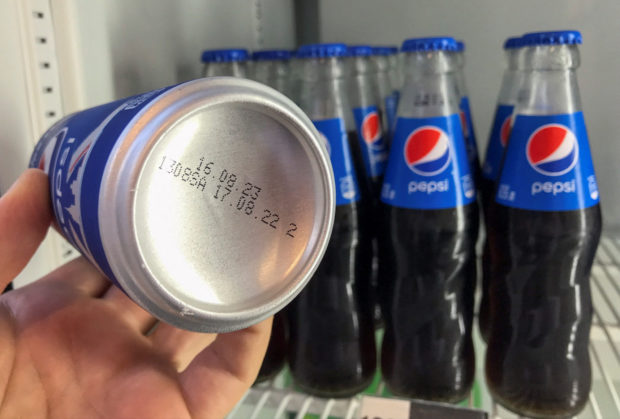PepsiCo ends Pepsi, 7UP production in Russia months after promising halt over Ukraine

A Reuters employee holds a can of Pepsi to demonstrate its manufacture date at a gym in central Moscow, Russia September 20, 2022. REUTERS/Alexander Marrow
NEW YORK/MOSCOW – PepsiCo Inc has stopped making Pepsi, 7UP and Mountain Dew in Russia nearly six months after the U.S. company said it would suspend sales and production after Moscow sent tens of thousands of troops into Ukraine.
Pepsi’s announcement came after Reuters visited dozens of supermarkets, retailers and gyms in Moscow and beyond and found cans and bottles of Pepsi printed with July and August production dates from factories within Russia.
The most recent date on a Pepsi product was Aug. 17.
In a statement to Reuters, the U.S. company said it had stopped making concentrates for PepsiCola, Mirinda, 7Up and Mountain Dew in Russia.
“All concentrates have subsequently been exhausted in Russia and production has ended,” a PepsiCo spokesperson said on Sept. 8, the first public comments on the matter since the company announced in early March it was suspending production, sales, promotional activities and advertising in Russia.
Article continues after this advertisementThe spokesperson said this was “in line with the announcement we made in March 2022” but declined to comment when asked for an update on sales and whether they had been halted.
Article continues after this advertisementThe continued production means sodas are still widely available in Moscow and also in Vladivostok in the far east and Krasnoyarsk in Siberia, according to a review by Reuters.
A gym owner in Moscow said it had placed an order with Pepsi as recently as mid-August.
The West has not sanctioned food and drink as part of sweeping measures aimed at punishing Russia over its actions in Ukraine.
But the continued availability highlights the complexity of withdrawing from one of the world’s largest countries. In 2021, Russia was New York-based Pepsi’s third-biggest market, after the United States and Mexico.
Earlier in the summer, shops in the capital were still selling off stockpiles of foreign beers, months after the brewers said they would halt production.
Atlanta-based rival Coca-Cola Co’s production in Russia also continued after it said in March it would suspend operations.
The company said in June its bottler, Coca-Cola HBC AG, a separate company, and existing customers in Russia were depleting stock, after which production and sales of Coke and other brands would stop in Russia.
PepsiCo in March said it would continue to sell daily essentials, such as milk and other dairy offerings, baby formula and baby food, in Russia. The company has operated in Russia for more than 60 years and its colas were one of the few Western products allowed in the Soviet Union prior to its collapse.